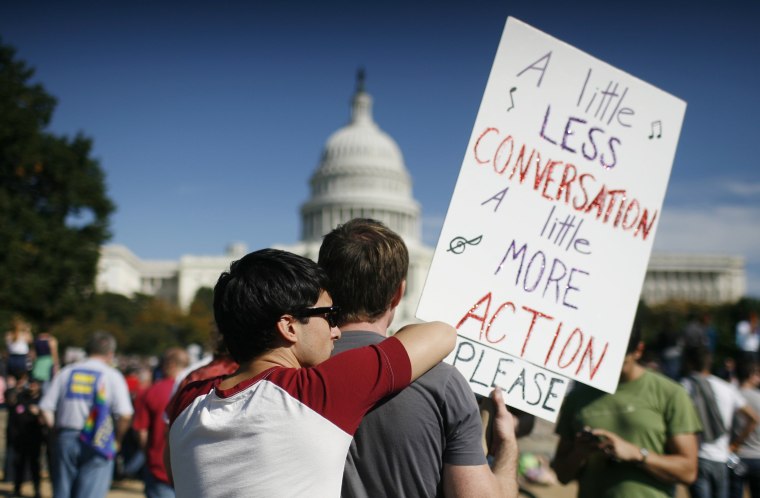Three-quarters of Americans say that they support openly gay people serving in the U.S. military, according to a new Washington Post-ABC News poll, a finding that could lend momentum to the Obama administration's effort to dismantle the policy known as "don't ask, don't tell."
The level of public support for allowing gay men and lesbians to serve openly far outpaces that in the spring of 1993, when Congress and the Clinton administration established the policy.
Civilian and military officials held their first meetings this week to begin a year-long review of "don't ask, don't tell," which forbids commanders to ask about service members' sexuality and requires the discharge of openly gay men and women. President Obama called for the policy's repeal last month in his State of the Union address, and the military's top civilian and military leadership has also expressed personal support for a repeal.
Defense Secretary Robert M. Gates last week appointed Gen. Carter F. Ham, commander of U.S. Army forces in Europe, and Jeh C. Johnson, Defense Department general counsel, lead a team to study a possible repeal.
Ham flew from Germany to Washington this week to meet with Johnson, according to senior defense officials, but most meetings were postponed because of the snowstorm that paralyzed the capital. They and their team hope to deliver recommendations to Gates by mid-March on how to revise the current policy to de-emphasize "third-party outings" -- when another person reveals a service member's homosexuality -- according to several military officials. The officials spoke on the condition of anonymity because they were not authorized to speak on the record.
Once the study is complete, the Pentagon team will determine how best to survey active-duty service members and their families on any change in the policy. Some officials favor asking the Rand Corp. to provide an updated version of the 1993 study it conducted.
The percentage of Americans who say they support gays openly serving is the same as a Post-ABC News poll found in July 2008; both are far above the 44 percent who said so in May 1993. In the new poll, majorities across party lines favor such a policy, with support among Democrats (82 percent) and independents (77 percent) higher than among Republicans (64 percent).
The poll also reveals several sharp demographic divides. Men (65 percent) and seniors (69 percent) are far less likely than are women (84 percent) and young adults (81 percent under age 30) to say that gays should be allowed to serve if they have disclosed their sexual orientation. Knowing a gay person makes a big difference: Among those who say they have a gay friend or family member, 81 percent support allowing gay people to serve openly, compared with 66 percent who say they do not know someone who is gay.
The poll was conducted by telephone Feb. 4-8 among a random national sample of 1,004 adults, including users of both conventional and cellular phones. The margin of sampling error is plus or minus three percentage points.
